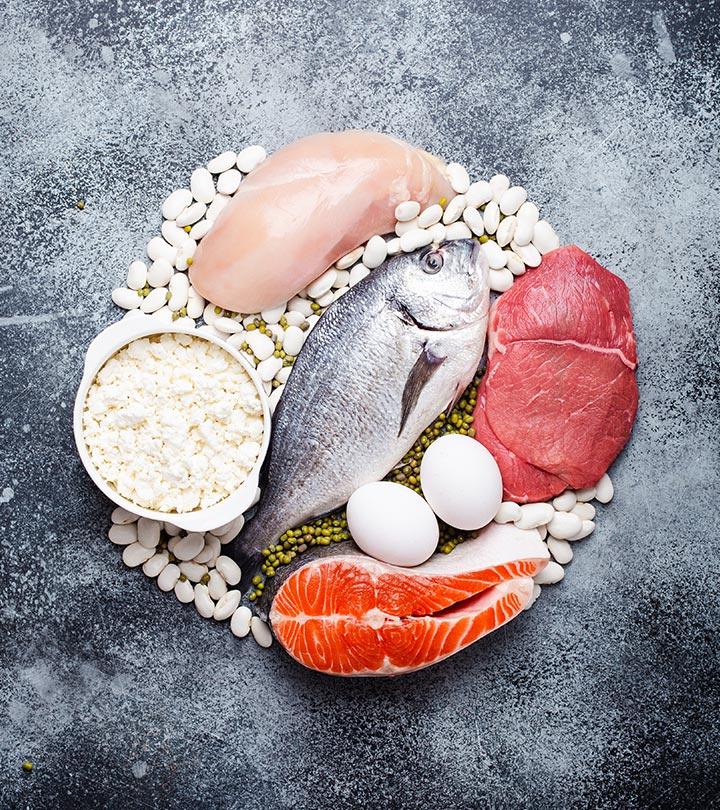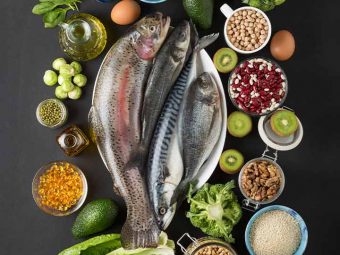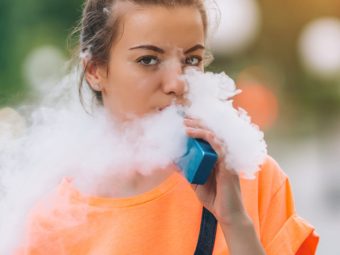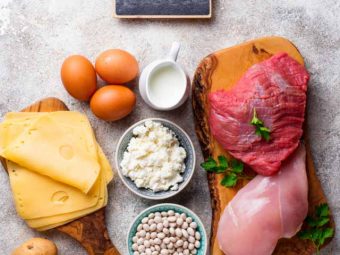10 Foods High In Choline, Health Benefits, & Deficiency Effects
Strengthen your body and improve its health by consuming some choline-rich food items.

The micronutrient choline plays a vital role in improving cardiovascular health, enhancing cognitive ability, and reducing cancer risk. Including choline-rich foods is a way to get this nutrient as our body produces it in limited amounts. It is found in many animal and plant foods. Keep reading to know which foods are rich in choline, the benefits of this nutrient, and how much choline you need for your body. Scroll down.
In This Article
Choline-Rich Foods
1. Whole Eggs
Eggs are the best and primary source of choline. One large egg with yolk contains 147 mg of choline, which is more concentrated in the yolk (680 mg/100g) than the egg white (1 mg/100 g) (1 ),(2). This essential nutrient gets absorbed more easily when consumed in its natural form (bound to phospholipids) than as a supplement. Studies suggest that phospholipids in egg yolk improve choline absorption (3). Higher choline intake can, in turn, improve cognition function in humans (4).
2. Fish
Seafood is a rich source of several nutrients like choline. Fish like tuna, salmon, and haddock have high choline content — and three ounces of smoked salmon contains 187 mg of choline (5). A study by the Child and Family Research Institute, Canada, found that higher fish intake improves blood concentrations of vitamin D, choline, and DHA (omega-3 fatty acid) (6).
3. Organ Meat
Consuming at least 90g of meat per day along with eggs (one per three days) and milk products helps meet the daily choline requirement in children (7). One slice (85g) of beef liver contains 359 mg of choline (8). Beef was shown to improve iron content in blood and enhance cognitive function in young women. However, it had no specific benefit over non-beef protein with regard to iron levels ( 9). Three ounces of chicken liver, chicken broiler, and turkey contain 247 mg, 56 mg, and 71.7 mg of choline, respectively (1),(9).
4. Soy
Raw soybeans (100g) contain 116 mg of choline (10). They can be the ultimate source of choline for vegetarians. Such individuals can also take soy products like tofu, soy milk, tempeh, and edamame.
5. Cruciferous Vegetables
Green vegetables like broccoli and cauliflower are rich sources of choline. One cup each of chopped broccoli (91g) and chopped cauliflower (107g) contains 17 mg and 47.4 mg of choline, respectively (11 ),(12). Besides, one cup (160g) of cooked Brussels sprouts provides 31.2 mg of choline (13 ).
6. Potatoes
One medium potato (173g) contains 24.9 mg of choline (14 ). Red potatoes are another great source of choline with carbs. One baked small red potato (138g) provides 26.1 mg of choline (15).
7. Beans
Studies suggest that immature lima beans are the best source of choline for vegans (16). One cup (170g) of lima beans contains 75 mg of choline (17). Also, 100g of kidney beans provides 30.5 mg of choline (18).
8. Shiitake Mushrooms
Shiitake mushrooms are rich in flavor. Cooked shiitake mushrooms (100g) provide 36.8 mg of choline, and these can be added to your soups, pasta, or stir-fries (19 ). Their regular intake can help improve immunity and reduce inflammatory markers (20). They also have anti-oxidative and anti-atherosclerotic properties that help reduce cardiovascular diseases (21).
9. Cottage Cheese
Dairy products like low-fat milk and cottage cheese are excellent sources of choline. One cup (210g) of cottage cheese contains 38.6 mg of choline (22). It is also rich in calcium, which is essential for maintaining bone health and weight loss (23), (24). Besides, it has a mild taste and is easy to incorporate into your diet. Add it to your salads, baked items, smoothies, or use it as an alternative to sour cream.
10. Almonds
Almonds are highly nutritious tree nuts with many health benefits. One cup (141g) of unroasted almonds contains 73.5 mg of choline (25). You can have them in your breakfast or blend them to make smoothies.
Besides, fruits like kiwi and apples are also rich sources of choline. A half-cup each of raw kiwi and chopped raw apples contain 7 mg and 2 mg of choline, respectively (26).
Consuming foods with choline is associated with many health benefits. Keep scrolling to know them.
What Are The Health Benefits Of Choline?
- May Improve Brain Function
Choline is an essential nutrient that produces acetylcholine (neurotransmitter). Loss of cholinergic neurons is associated with impaired cognitive function, particularly memory loss and Alzheimer’s disease. Higher choline intake is found to improve cognitive performance. A review published in the American Journal of Clinical Nutrition suggests that dietary choline intake has neuroprotective effects and can improve cognitive function (27). Choline intake during pregnancy can also improve fetal brain development (28).
- May Support Heart Health
Long-term choline intake may reduce the risk of inflammatory conditions and cardiovascular diseases (29). A study by Wageningen University, The Netherlands, on post-menopausal women found that high choline intake can lower homocysteine (an amino acid) levels. High homocysteine levels are associated with an increased risk of CVD ( 30). It may also protect the heart by reducing blood pressure and changing lipid profiles.
However, certain studies have shown no association between choline intake and a reduced risk of CVD. Therefore, more research needs to be done.
- May Reduce Risk Of Breast Cancer
High choline intake may help prevent the development of breast cancer in post-menopausal women. Choline may also help reduce breast cancer mortality once diagnosed (31),( 32). However, limited studies are available to support this claim.
Inadequate intake of choline can impact your health. Let’s discuss the negative effects of choline deficiency in the following section.
Effects Of Choline Deficiency
Choline is a key nutrient in maintaining the integrity of cell structure, DNA synthesis, and metabolism. A study by the March of Dimes in Berkley, California, suggests that low dietary intake of choline in pregnant women significantly increases the risk of neural tube and oral cleft defects in babies (33). Choline deficiency in people is also associated with liver and muscle dysfunction (and damage) and increases the risk of non-alcoholic fatty liver disease (choline plays an important role in fat transportation from the liver and its deficiency may cause fat accumulation in the liver), apoptosis, and increased DNA strand breaks (34).
You must now be willing to include choline in your diet. But how much choline should you take to meet your dietary needs?
How Much Choline Does A Human Body Need?
Adequate choline requirements for different age groups include (26):
| Age | Male | Female |
|---|---|---|
| 0-6 months | 125 mg/day | 125 mg/day |
| 7-12 months | 150 mg/day | 150 mg/day |
| 1-3 years | 200 mg/day | 200 mg/day |
| 4-8 years | 250 mg/day | 250 mg/day |
| 9-13 years | 375 mg/day | 375 mg/day |
| 14-18 years | 550 mg/day | 400 mg/day |
| 19+ years | 550 mg/day | 425 mg/day |
Pregnant women should take 450 mg/day of choline and increase it to 550 mg/day during breastfeeding.
Infographic: Choline: Risk Groups For Deficiency & Toxicity
Choline is one of the most essential nutrients the human body needs. However, according to many studies, the dietary choline intake of most humans has been found to be below par. In the following infographic, we list the groups that are at risk of choline deficiency. We have also provided insight into choline toxicity and its symptoms. Check it out!
Illustration: StyleCraze Design Team
Choline is an important vitamin that can be present in both animal and plant sources. Its consumption may aid in boosting heart and brain health and lessen the risk of cancer. Conversely, its absence can result in muscle damage as well as non-alcoholic fatty liver disease. It’s important to keep in mind that pregnant women need enough choline to ensure that the fetal brain develops properly. To ensure your body gets adequate choline, eat choline rich foods such as cruciferous vegetables, eggs, organ meats, fish, almonds, and beans.
Frequently Asked Questions
Are bananas high in choline?
No, a medium sized banana contains only about 12 mgs of choline.
Do lemons have choline?
Lemons have small quantities of choline and are not considered a good source.
Does cooking eggs destroy choline?
No,cooking eggs does not destroy any significant quantity of choline.
Do avocados have choline?
Avocados contain moderate amounts of choline, around 14.2 mg per 100 g.
Can choline reverse fatty liver?
While fatty liver disease is associated with choline deficiency, there is no evidence to support that consuming choline can reverse the condition.
What happens if you have too much choline?
Consuming choline in very large quantities may lead to liver toxicity, low blood pressure, increase the risk of cardiovascular issues and cause side effects such as vomiting, nausea, fishy odor and excessive sweating (1).
Key Takeaways
- Choline is a nutrient found in various animal and plant foods, including eggs, fish, organ meat, soy, green vegetables, potatoes, beans, shiitake mushrooms, cottage cheese, and almonds.
- Foods high in choline have been linked to various health benefits, including improved brain function, enhanced heart health, and a lower risk of cancer.
- However, remember that people with a choline deficiency may develop muscle damage and non-alcoholic fatty liver disease.
References:
Articles on StyleCraze are backed by verified information from peer-reviewed and academic research papers, reputed organizations, research institutions, and medical associations to ensure accuracy and relevance. Read our editorial policy to learn more.
- Choline
https://www.ncbi.nlm.nih.gov/pmc/articles/PMC6259877/ - The Golden Egg: Nutritional Value, Bioactivities, and Emerging Benefits for Human Health
https://www.ncbi.nlm.nih.gov/pmc/articles/PMC6470839/ - Natural Choline from Egg Yolk Phospholipids Is More Efficiently Absorbed Compared with Choline Bitartrate; Outcomes of A Randomized Trial in Healthy Adults
https://www.ncbi.nlm.nih.gov/pmc/articles/PMC6893749/ - A Comprehensive Review of Eggs, Choline, and Lutein on Cognition Across the Life-span
https://pubmed.ncbi.nlm.nih.gov/29451849/ - Choline: An Essential Nutrient for Public Health
https://www.ncbi.nlm.nih.gov/pmc/articles/PMC2782876/ - Low fish intake is associated with low blood concentrations of vitamin D choline and n-3 DHA in pregnant women
https://pubmed.ncbi.nlm.nih.gov/22691303/ - Choline Intake and Its Food Sources in the Diet of Romanian Kindergarten Children
https://www.ncbi.nlm.nih.gov/pmc/articles/PMC5579689/ - Beef liver braised
https://fdc.nal.usda.gov/fdc-app.html#/food-details/1098653/nutrients - Improvements in Iron Status and Cognitive Function in Young Women Consuming Beef or Non-Beef Lunches
https://www.ncbi.nlm.nih.gov/pmc/articles/PMC3916851/ - Turkey, whole, breast, meat only, cooked, roasted
https://fdc.nal.usda.gov/fdc-app.html#/food-details/171496/nutrients - Soybeans, mature seeds, raw
https://fdc.nal.usda.gov/fdc-app.html#/food-details/174270/nutrients - Broccoli raw
https://fdc.nal.usda.gov/fdc-app.html#/food-details/170379/nutrients - Choline and betaine intakes are associated with reduced risk of nasopharyngeal carcinoma in adults: a case–control study
https://www.ncbi.nlm.nih.gov/pmc/articles/PMC3915107/ - Cauliflower, raw
https://fdc.nal.usda.gov/fdc-app.html#/food-details/169986/nutrients - Brussels sprouts, NS as to form, cooked
https://fdc.nal.usda.gov/fdc-app.html#/food-details/1103467/nutrients - Potatoes, white, flesh and skin, baked
https://fdc.nal.usda.gov/fdc-app.html#/food-details/170434/nutrients - Potatoes, red, flesh and skin, baked
https://fdc.nal.usda.gov/fdc-app.html#/food-details/170435/nutrients - Choline, Neurological Development and Brain Function: A Systematic Review Focusing on the First 1000 Days
https://www.ncbi.nlm.nih.gov/pmc/articles/PMC7352907/ - Lima beans, immature seeds, cooked, boiled, drained with salt
https://fdc.nal.usda.gov/fdc-app.html#/food-details/169316/nutrients - Beans, kidney, red, mature seeds, cooked, boiled, with salt
https://fdc.nal.usda.gov/fdc-app.html#/food-details/175242/nutrients - Mushrooms, shiitake, cooked, without salt
https://fdc.nal.usda.gov/fdc-app.html#/food-details/168437/nutrients - Consuming Lentinula edodes (Shiitake) Mushrooms Daily Improves Human Immunity: A Randomized Dietary Intervention in Healthy Young Adults
https://pubmed.ncbi.nlm.nih.gov/25866155/ - Lentinula edodes (shiitake mushroom): An assessment of in vitro anti-atherosclerotic bio-functionality
https://www.ncbi.nlm.nih.gov/pmc/articles/PMC6302894/ - Cheese, cottage, creamed, large or small curd
https://fdc.nal.usda.gov/fdc-app.html#/food-details/1098045/nutrients - Calcium- and Phosphorus-Supplemented Diet Increases Bone Mass after Short-Term Exercise and Increases Bone Mass and Structural Strength after Long-Term Exercise in Adult Mice
https://pubmed.ncbi.nlm.nih.gov/27008546/ - Role of dietary calcium and dairy products in modulating adiposity
https://pubmed.ncbi.nlm.nih.gov/12733746/ - Almonds, unroasted
https://fdc.nal.usda.gov/fdc-app.html#/food-details/1100508/nutrients - Choline
https://ods.od.nih.gov/factsheets/Choline-HealthProfessional/ - The relation of dietary choline to cognitive performance and white-matter hyperintensity in the Framingham Offspring Cohort
https://www.ncbi.nlm.nih.gov/pmc/articles/PMC3252552/ - Choline: Critical Role During Fetal Development and Dietary Requirements in Adults
Choline: Critical Role During Fetal Development and Dietary Requirements in Adults – PMC (nih.gov) - Dietary Choline and Betaine Intakes and Risk of Cardiovascular Diseases: Review of Epidemiological Evidence
https://www.ncbi.nlm.nih.gov/pmc/articles/PMC3347848/ - Prospective study on dietary intakes of folate, betaine, and choline and cardiovascular disease risk in women
https://pubmed.ncbi.nlm.nih.gov/17375117/ - High intakes of choline and betaine reduce breast cancer mortality in a population-based study
https://www.ncbi.nlm.nih.gov/pmc/articles/PMC2775010/ - Choline metabolism and risk of breast cancer in a population-based study
https://www.ncbi.nlm.nih.gov/pmc/articles/PMC2430758/ - Dietary choline deficiency causes DNA strand breaks and alters epigenetic marks on DNA and histones
https://pubmed.ncbi.nlm.nih.gov/22041500/



![choline risk group for deficiency and toxicity [infographic]](https://cdn2.stylecraze.com/wp-content/uploads/2022/08/Choline-Risk-Groups-For-Deficiency-Toxicity-scaled.jpg)







